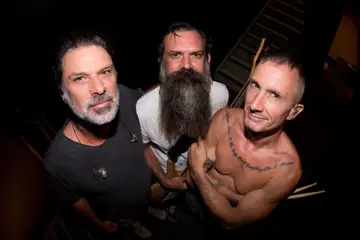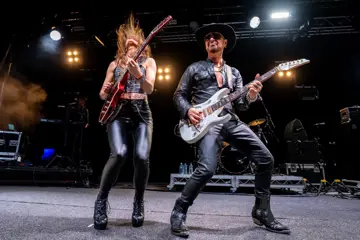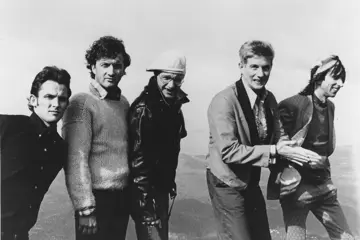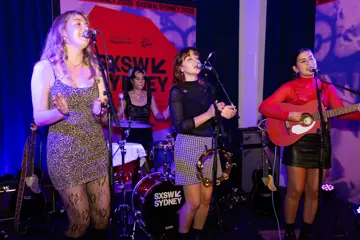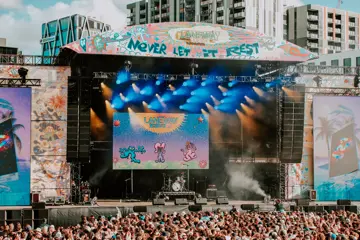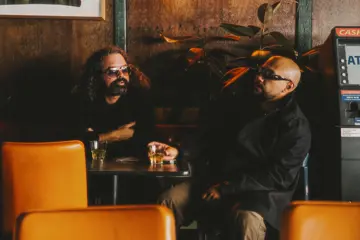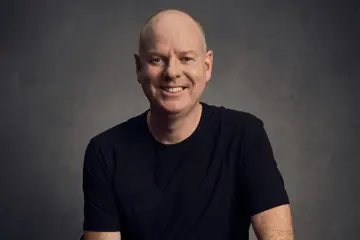There's no other way to say it; Jimmy Cliff is one of the biggest reggae stars in the history of the genre and one of popular music's true living legends. He's also a mighty hard worker. 2012 saw him tour tirelessly, release a critically acclaimed new album and now he has an almighty tour of Australia planned kicking off next month.
“Just a little bit!” he stresses, when asked if he's taking time off before heading to Australia.
Cliff isn't much of a talker, but his responses are kind and genuine. As he sits in his home in Kingston, Jamaica, he reflects back on past visits Down Under.
“I always have a great audience there so I'm really looking forward to that,” he says. “They're always very wonderful and responsive and they appreciate my music, so I'm looking forward to playing my new material to them. That means a lot to me.”
That new material is his 2012 album Rebirth, a fitting name for the record that sees Cliff go way back to his reggae roots with a little help from Rancid frontman Tim Armstrong.
“I think it turned out wonderful. It's going back to the roots of the reggae from years back, reintroducing all of that to a new audience, and I think it turned out great,” Cliff says of the record. “Tim is a very creative man and he's a reggae connoisseur and we bounce of each other so it was a really good creative process.”
The album sounds like it was made in 2012, but features many respectful throwback moments that call to mind the reggae music of another era. Armstrong's passion for the genre meant that balancing the old and the new wasn't much of a challenge.
Don't miss a beat with our FREE daily newsletter
“He's such a great reggae lover that he knows all the right instruments to use,” Cliff explains. “So he got together a group of musicians who have the same kind of enthusiasm and knowledge about reggae and it came quite easily, really.”
“Reggae influenced punk and on that side of the Atlantic it was The Clash who was the leading punk group and on this side of the Atlantic it was Tim Armstrong and Rancid who were the leading punk rock group, so I thought I'd cover both sides of the Atlantic by covering one song from each of them. Plus, Guns Of Brixton was really kind of talking about the character I played in The Harder They Come.
He is one of the true progenitors of reggae music, but Cliff doesn't feel any responsibility to the genre to keep it alive and kicking, in fact, while he acknowledges his sizeable contribution to the style and its popularity, he doesn't tie himself down to it.
“First of all I'm a creator and an artist,” he says. “I contributed to creating reggae and establish it, but if one looks at my repertoire I've also created other music forms which didn't have, like, a label or whatever – like Sitting In Limbo or Many Rivers To Cross and songs like that. I feel a responsibility to myself to continue being creative.”
But that doesn't mean it ever feels like chore to the 64-year-old.
“Not at all, I'm doing what I think I have been put on this planet at this time to do,” he says. “I have fun doing it, I have more fun now than I did 20 years ago, because I am better at my craft and that makes it more enjoyable.”
Reggae will continue to live and to thrive worldwide, Cliff says, because reggae artists can't afford to have their music confined to Jamaican audiences.
“If you look at other musical forms like bossa nova which came out a long time ago, that came out of samba, those music forms are still alive but maybe not so much internationally. But reggae music I think made its international impact because the artists in Jamaica were always looking outside to sustain ourselves. Because Jamaica was not big enough to keep us sustained.”
As far as whether he believes that there can ever be a reggae superstar with the kind of following as his own, Cliff says it's possible with the right attitude.
“It comes down to the audience and what they have around them. It's about utilising the product – each artist has to realise that they are a product – to its fullest capacity. Once that is realised then the door will open.”
It seems as if Cliff is looking to work harder than ever in 2013, revealing that he has not only already started work on a new record but will also hope to have a new movie in production before the year is out. Cliff admits acting was his first love but that he had neglected it for so long due to his musical endeavours.
“I have a few movie scripts on the table and hopefully one of them will be going into production next year; I'm involved in the writing as well as the acting,” he says. “Acting was the thing I loved first, it was my first love. I have not really been able to pursue that area since I became a singer. So that is something that I have yet to accomplish to the vision that I have for myself. The vision is to win an Oscar!”
In 1972 Cliff starred in a Jamaican film by the name of The Harder They Come, where he played a reggae singer looking to make his record a hit, before falling into a life of drugs and crime. Cliff admits his latest film project shares a few similarities with The Harder They Come.
“The movie is along the lines of a would-be singer, he's not the same character as from The Harder They Come, but it is music-related, the main character in music-related.”
As far as the new record he has started working on goes, Cliff says not to expect anything along the lines of his most recent release.
“No, it's a different direction,” he says of his forthcoming album. “I've done Rebirth and the next step should be something different.”
Cliff's live performances are truly special, the singer brimming with energy out in front of a stunning band who run through the endless list of classic songs Cliff has been responsible for over the years.
“I'm going to make sure I perform the classics that are expected and at the same time play some of the new material,” he says of the forthcoming Australian shows. “My show is always very uplifting and positive so when somebody leaves my show I think that they can go back to work or to school or wherever feeling good about themselves and feeling good about life. That is what I live for, I guess, as an artist. To know that somebody can come up to me and say that my music turned their life around or kept them sustained.”
Jimmy Cliff will be playing the following dates:
Friday 8 March - WOMADelaide, Botanic Park, Adelaide SA
Wednesday 20 March - Tanks Arts Centre, Cairns QLD
Sunday 24 Match - West Coast Blues N Roots Festival, Fremantle Park, Perth WA
Wednesday 27 March - Corner Hotel, Melbourne VIC
Thursday 28 March - Metro Theatre, Sydney NSW
Friday 29 March - Bluesfest, Byron Bay NSW
Sunday 31 March - Deni Blues Fest, Deliniquin NSW

